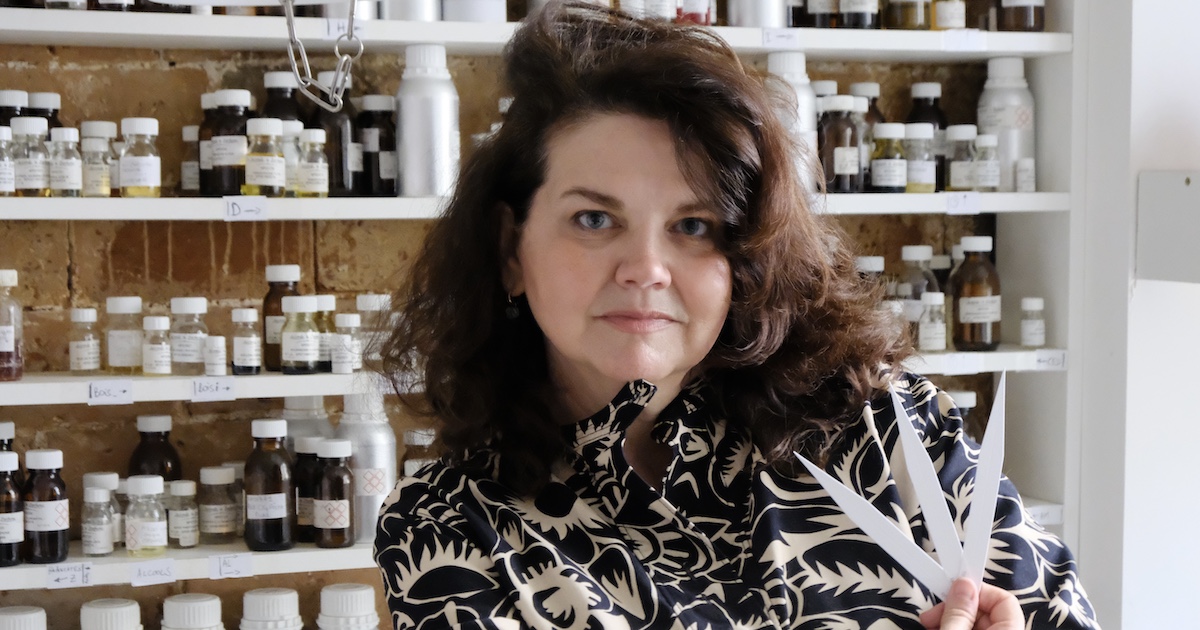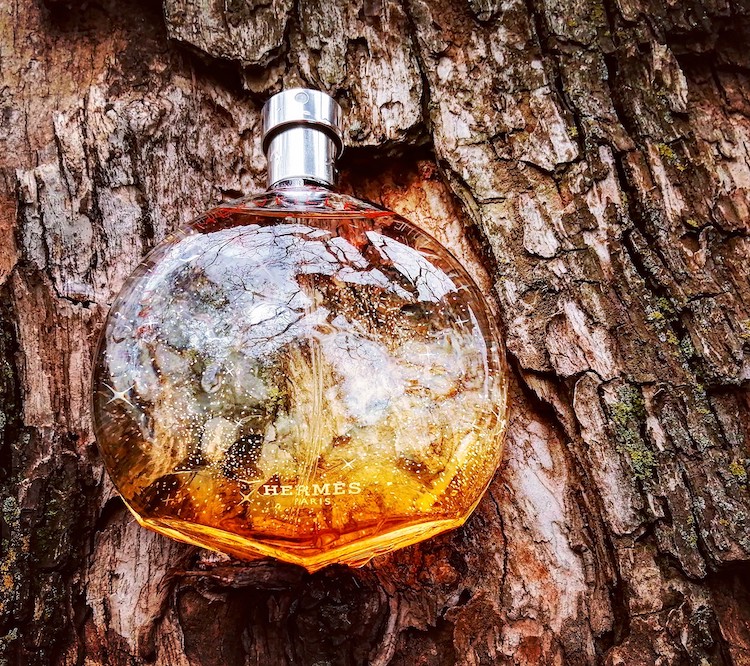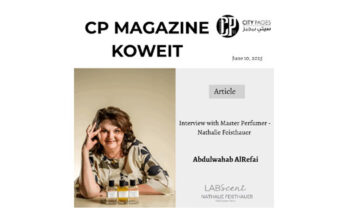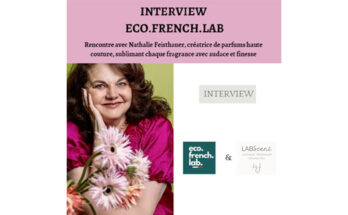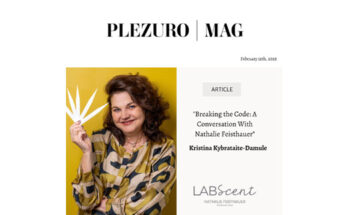by Richard Goller on everfumed.com, July 29th 2022
Some people you don’t even have to meet to get a sense of them. Nathalie Feisthauer is one of those individuals. And I use the word “individual” purposefully because the 30-year+ career of the Paris-based master perfumer has been defined by unconventionality.
From her education at Roure Bertrand Dupont (now the Givaudan Perfumery School) to creations for prestigious brands such as Cartier, Comme des Garçons, Hermès and Etat Libre d’Orange (see below for more), Nathalie Feisthauer’s perfume path has been one of not following the norm.
- Aramis Havana EDT (1994)
- Versace Blonde EDT (1995)
- Pierre Balmain Vent Vert EDT (1999)
- Cartier Must de Cartier Pour Homme EDT (2000)
- Oriflame Giordani Gold Original EDP (2002)
- Yves Saint Laurent Kouros Tattoo EDT (2007)
- Lancôme Hypnôse Senses EDP (2009)
- Amouage Honour Man EDP (2011)
- Ferrari Essence Oud EDP (2012)
- Etat Libre d’Orange Putain des Palaces EDP (2013)
- Van Cleef & Arpels Rêve EDP (2013)
- Comme des Garçons Blue Cedrat EDP (2013)
- Carolina Herrera Oud Couture EDP (2015)
- Aedes de Venustas Pélargonium EDP (2017)
- MDCI Parfums Cuir Cavalier EDP (2019)
- Nomenclature Fluo–ral EDP (2019)
- Puredistance No. 12 Perfume (2021)
After working for major fragrance companies such as Givaudan (1983-2008) and Symrise (2008-2014), her strong streak of independence found expression in the formation of her own company, LAB-Scent.
Nathalie Feisthauer now focuses on producing idiosyncratic perfumes for niche brands such as A-chromiq, Alendor, Burdin and Maison Rebatchi.
I also get the impression she’s quite playful when she answers one last question at the start of her three-week vacation on the Italian island of Ischia. When I say her somewhat jealously, “What an inspiring place to be”, she replies, “Totally, beautiful, farniente [Italian for “doing nothing”], pool, sea…”
In this interview, we chat about the influence of YSL Opium, company codes and the benefits of going independent.
What fragrance are you wearing today ?
I’m wearing my new creations, some of which will soon be launched on the market.
The decision to become a perfumer is often an accumulation of events. Anything that stands out for you ?
The discovery of Opium by Yves Saint Laurent was a life-changing revelation for me. It was the moment I understood my vocation.
When you started studying perfumery at Roure in 1983, it was unusual not to come from a perfumery family. Did that different background make it more challenging for you ?
Yes, it was challenging and even more magical and new for me because I didn’t come from Grasse, and I wasn’t used to seeing and smelling all these beautiful raw materials. So it was like heaven when I arrived at the school. At the same time, it allowed me to understand the codes of companies and their functioning.
What was your fine fragrance debut ? What are your thoughts on it now ?
My first fine fragrance was Elysium for Clarins [released in 1993], a floral-fruity fragrance for women. I composed it in New York at the age of 26, and it was a dream coming true. It was, and still is, an original fragrance, of which I am very proud.
How do you approach each new perfume project ?
I read the brief, taking the time to see what it evokes to me, whether it is images, landscapes, smells, or textures. Then I begin to formulate and smell my tests before refining them step by step. I propose tests according to the brief, but also “diagonals”, meaning smells not requested but resulting from instantaneous inspiration.
Your creations show an incredible range of versatility. Was that deliberate ?
Yes, I like to diversify my creations and propose original perfumes, different from those offered on the current market. Nowadays, consumers are asking to stand out from the crowd and want to wear innovative, original, never-smelled perfumes. This is what I propose to them through my creations.
I have many favourite creations of yours. But let’s focus on one in particular: Hermès Eau de Merveilles from 2004. What was unusual about its creation ?
I created it with Ralf Schweiger, and its particularity is that it was created around ambergris, an animal note embellished by other woody, hesperidized, spicy and musky notes.
It was a very innovative perfume at the time. Through it, I paid tribute to Véronique Gautier, the artistic director of Hermès who had the courage to launch this fragrance.
How did you approach the creation of Van Cleef & Arpels Gardénia Pétale EDP (2009) in terms of using synthetics and naturals ?
I wanted to capture the aerial, humid and tropical facets of this majestic flower. The real gardenia scent is heavy. I worked more on the texture of the petals. In this fragrance, there is no gardenia natural oil.
When did you decide to go independent ? What was your thinking behind that decision ?
I created LAB-Scent eight years ago, after working for 30 years in corporate companies that trained me a lot and allowed me to become a professional perfumer. Becoming independent was an aspiration for personal fulfilment. It allows me to be self-employed, to make a name for myself thanks to my creations, and to propose original fragrances. Furthermore, I like the relationship it creates with brand art directors that I didn’t have before.
Why do you prefer to focus on niche brands now ?
The niche market is less codified and allows much more creativity. Some customers ask for very original perfumes and from the four corners of the world. I like this diversity, this freedom of creation, the possibility of using more prestigious materials and claiming them, which mass perfumery doesn’t do, and having discussions from a creative point of view.
I’m loving your 2021 creation for Maison Crivelli, Lys Sølaberg. Was it easy to translate Thibaud Crivelli’s experience into olfactory reality ?
Thibaud Crivelli is a man with a thirst for adventure who has travelled extensively and loves nature in its raw state. Working on this fragrance, I interpreted his memory of the Faroe Islands, Denmark. I wanted to transcribe their remarkable beauty, with the sun shimmering on the sea, the sweet and smoky aspect of the lilies, the power of the wind, the mineral stone, and the darker, more humid aspect of the peat. I wanted to convey the idea of mankind faced with rugged nature.
And so, there is a real duality in this creation. It opens with a beautiful pearlescent light, then evolves towards a note that evokes the power of the elements, which is almost telluric, and not at all fragile.It develops with contrasts between the smoky, spicy lily facet, the radiant, slightly alcoholised quince, and a peaty/woody facet provided by the amber woods and an overdose of Ambroxan, as well as an absolute of roasted oak shavings, which adds an incredibly sensual patina to the accord, evoking the thatched roof houses typical of the region.
I haven’t tried it yet, but Zoologist Cow, which was released this year, sounds wonderful. Tell us a bit more about it.
Zoologist perfumes are fascinated by animals. They capture their particularities and transforms them into unusual, beautiful, funny, even shocking perfumes.Cow is a green-floral fragrance with an apple and sage head; a milky, heliotropic and floral heart; and amber-woody-musky base notes. It evokes a green pasture with peaceful cows. It’s an original perfume you’ll either love or hate. You must try it on your skin to see if you like it or not. If you do, it is soft and addictive and could become your perfume for life.
When you’re not creating perfumes, what will we find you doing ?
I enjoy travelling, cooking and spending time with my kids. They make me discover new smells and flavours and stimulate my creativity. I also love being in my garden in Montmartre.
Original article on : www.everfumed.com

